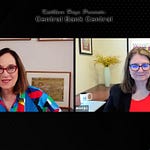As central banks around the world pivot to the post-pandemic rate cut cycle, Governor Rhee Chang-Yong two weeks ago led the Bank of Korea to its first rate cut in more than three years with a 25bps move. This contrasts with recent moves by the Federal Reserve, the Bank of Canada and the Reserve Bank of New Zealand among others who have opted for more aggressive 50 bp cuts.
When Rhee joined me at the annual meetings of the International Monetary Fund and World Bank in Washington D.C. this week it was just two days after South Korea had reported a much lower-than-expected 0.1% increase in its third quarter GDP rate. So I asked Rhee what factors he is watching to gauge when and how much to cut rates again. If growth keeps slowing, manufacturing continues to pull back from albeit strong levels, the Korean won continues to weaken as the U.S. dollar strengthen among others, would he consider a 50bp cut at the November policy meeting?
He said he hopes the BOK will not need to do so.
First of all, he notes, even as growth slows it remains above its potential rate, and the extent to which it slows will be an important gauge to watch when determining the size and timing of future rate cuts.
”And most importantly, we have raised our interest rate (to a level) much lower than other advanced economies, and with that I think we achieved…price stability earlier than others,” he says.
”So, now many people say the U.S. cut 50 (basis points), Canada cut 50, all these things. But look at what interest rates are: Canada now has 3.75% and our is 3.25%,” Rhee says. ”So they have many reasons to cut the rates very quickly because they…went up too much… too fast.”
Another factor? Most of Korea’s debt is made up of floating rate obligations so the impact of a rate hike if needed “is much bigger” than in other countries. This means that “on the downside we can be flexible.”
Here’s the clincher.
”Overall I think it will be very important not to make a mistake that if you cut too hastily, and then you have some reason to move it up, the cost will be very high. That's the lesson that we learned.
”So we will tap in to get all the data, but I think compared with advanced economies…which really increased rates very fast, and then maybe they’ll go down very fast again… we have a different pattern,’ he concludes.
We covered a lot more ground from his estimate of Korea’s neutral rate and how it compares with that of the U.S., Canada and others to the potential impact of tariffs on Korea’s export-driven economy, to expectations of expansionary U.S. fiscal policy that will put upward pressure on U.S. bond yields and there the U.S. dollar.
Dive in and hear what he has to say as the central bank rate cut parade continues.
Rhee Chang Yong currently serves as the governor of the Bank of Korea and is a member of the board of directors of the Bank for International Settlements (BIS). Recently, he chaired the BIS committee on the global financial system (CGFS). Rhee has more than thirty years of professional experience as an economist, financial advisor, and academic.
Prior to assuming his current role on April 21, 2022, Rhee served as the director of the Asia and Pacific department at the International Monetary Fund (IMF), where he oversaw the Fund’s work across the region. Before joining the IMF in February 2014, he was the chief economist at the Asian Development Bank (ADB).
Rhee has also held several highprofile positions in the Korean government, including serving as the secretary general and sherpa of the Presidential Committee for the 2010 G20 Seoul Summit, as well as vice chairman of the Financial Services Commission (FSC) and chairman of the Securities and Futures Commission of Korea.
In addition to his public service career, Rhee was a professor of economics at Seoul National University and an assistant professor at the University of Rochester. He has been an active policy advisor to the Korean government, including to the office of the president and to the ministry of economy and finance, as well as to the Bank of Korea and to other institutions. Rhee has published extensively on macroeconomics and financial economics, as well as on the Korean economy. He holds a PhD in economics from Harvard University, and an undergraduate honors degree in economics from Seoul National University.













Share this post